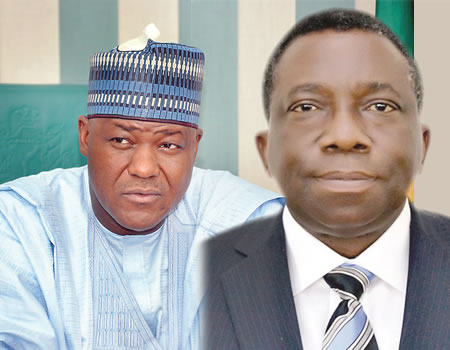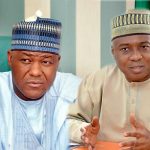In this piece, KOLAWOLE DANIEL, reports the heated argument among members of the House of Representatives in respect of a motion on the dwindling fortunes of primary healthcare centres in the country.
Primary healthcare is a grass root approach to provide healthcare services to communities. In effect, it is part of government’s effort to ensure that people at the grassroots have access to affordable healthcare services.
From records, the first attempt by government to introduce what now metamorphosed into primary healthcare was the introduction of Basic Health Services Scheme, (BHSS) between 1975 and 1980.
While between 1986 and 1992 late Professor Olikoye Ransome-Kuti “ruralised” the Primary Healthcare with the development of Model Primary Healthcare in 52 local government areas in 1992, the Federal Government established the National Primary HealthCare Development Agency (NPHCDA), with mandate to make the primary healthcare accessible to the grassroots.
However, not satisfied with the state of the primary healthcare centres in the country, the House of Representatives through a motion on the need to revive the primary healthcare centres in the rural communities called for status inquiry into the activities of the primary healthcare centres.
Specifically, the House urged the Federal Ministry of Health to direct the NPHCDA to evolve a mechanism to take an inventory of the primary healthcare centres in the country.
This, the House said would help to ascertain the status and needs of the primary healthcare centres in the rural communities, so that adequate funding could be extended to them.
To follow-up the resolution, the House mandated committees on healthcare services and health institutions to ensure implementation and report within eight weeks for further legislative action.
Honourable Joseph Edionwele who engineered the motion, acknowledged that, it is a fact that the Federal Government deployed enormous resources through the NPHCDA and intervention funds in building primary health centres across the rural communities in the country, but expressed worry that despite that, primary healthcare delivery services in the country particularly in the rural communities still remain in a poor state.
Speaking further, he said that, “the deteriorating health condition of the citizenry as noted in recent reports by the World Health Organisation (WHO) and other multilateral agencies in terms of increasing child/maternal mortality rate, resurgence of child-killer diseases and drop in average life expectancy for the nation that call for urgent action.”
In effect, he said that, many of the numerous health care centres built all over the country have not been equipped or provided with staff, as a result making them non-functional and of no benefits to the citizenry as they have remained abandoned and dilapidated.
Most of his colleagues, who contributed to the motion, were in agreement that the primary healthcare centres in the country should be given proper attention, in order to address the health challenges that are facing the rural communities.
Contributing to the motion, the chairman, House committee on Petroleum Downstream, Honourable Joseph Akinlaja said the two primary healthcare centres in his constituency have no drugs, saying that, the facilities at the centres are also dilapidated.
While Honourable Rotimi Agunsoye maintained that, it is better to allow local governments to take care of their job of handling the primary healthcare centres, since they are the closest to the rural communities, he added that there is nothing wrong in giving them money to function effectively.
Honourable Agunsoye’s if seen through, is capable of re-opening a key argument of local government autonomy as it is capable of freeing the councils from the apron string of their respective state governments which have consistently blocked the independence of the councils.
That issue brought another question to the fore and that is the often asked question as to what the local councils have done with the supposed “little funds” they are getting, since they also generate revenues independently.
Honourable Chika Adamu, who equally spoke on the issue, also towed the line of Honourable Agunsoye when he said that the local governments should be allowed to take proper care of the Primary Healthcare Centres that are not functioning.
Expressing a contrary view however, Honourable Ayo Omidiran noted that, the motion need not to be entertained because, “there is a provision in the 2017 budget that takes care of what the motion is seeking.”
But most lawmakers who spoke on the issue believed that since the 2017 budget is yet to be passed into law by way of appropriation act, nothing should be left undone to lift the state of primary healthcare centres.
The concern about health care delivery in the local areas has however been a thing of concern to the House with or without the passage of that motion.
Speaker Yakubu Dogara, had at a recent event also re-echoed his colleagues’ concern in the motion when he expressed worry over poor funding of primary healthcare services by the Federal Government.
He said that the centres need improved funding to guarantee delivery of primary healthcare to the people.
While speaking at the public hearing on financing healthcare and revitalisation in the country, the Speaker said that funding of the primary healthcare system in the country, was still characterised by low investment by Federal Government.
The Speaker, who was represented by the Minority Leader, Honourable Leo Ogor, said that there was need for Federal Government to come up with plans on how to raise funds to boost primary healthcare services in Nigeria.
Also, the Chairman of House Committee on Health Services, Honourable Chike Okafor, who spoke at the event decried the state of primary healthcare at the grassroots, saying, “Currently, there are 774 Local Government Areas (LGAs) with 9,572 political wards in Nigeria. At least, each of the council has one primary healthcare centre (PHC) that is not functional.”
The lawmaker attested that, “most of these PHC centres lack drug supplies, basic health infrastructures and cannot boast of good number of medical personnel. In fact, patients accessing these PHC centres can hardly afford the cost of transportation or cost of subsidised drugs in these centres due to the economic hardship of most rural dwellers.”
The Minister of Health, Professor Isaac Adewole, who also spoke at that forum said that there was need to reposition healthcare service delivery in the country, noting that there was need for partnership with individuals and corporate organisations to take the primary healthcare sector to greater height.
He further said that there was too much pressure on secondary and tertiary health institutions in the country as a result of defective or near non-existent primary healthcare system at the grass roots. The aggregate opinion at the forum as well as the contributions on the floor of the House tend towards the fact that there is need to improve budgetary provisions for the primary healthcare centres in the country, while the funds are to be monitored for effective utilisation by both the lawmakers, the civil society organisations and the stakeholders generally.
The consensus is that agencies with bias for primary healthcare should track the interventions of donor agencies, spirited individuals, corporate bodies and government in the area of primary healthcare so as to ensure efficiency and service delivery. As the saying goes, health is wealth, no serious nation worth its salt will joke with the health of the generality of its citizens.





